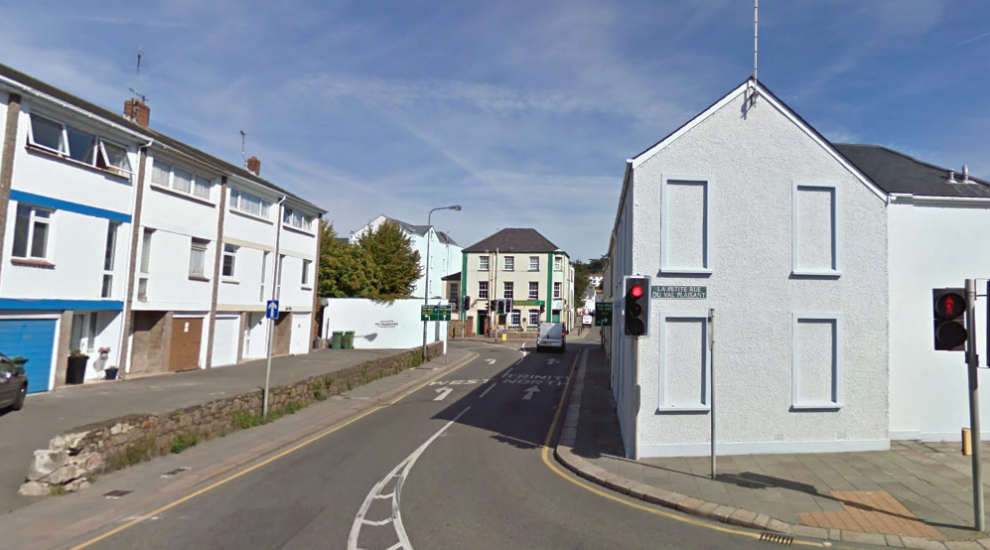

An Inquest has heard that a 67-year-old man died in hospital from complications following surgery three weeks after he had been struck by a vehicle while crossing the road at Val Plaisant.
Neville Joseph Whelan died on 21 January 2017 while in the intensive care unit at the Hospital.
An Inquest into his death heard Mr Whelan was crossing the road on Val Plaisant on 26 December 2016 when he was struck by a vehicle driving from la Petite Rue du Val Pleasant towards Rouge Bouillon. The impact broke Mr Whelan's legs and he fell to the floor. He was then taken to hospital where he died three weeks after from complications following surgery.
The police investigated the collision and decided no to prosecute the driver as they were satisfied he hadn't fallen below standards of driving or broken any law. A driver travelling in the right lane on Val Pleasant in a Toyota said that, as she was rounding the corner to face Robin Hood, Mr Whelan stepped off the pavement and she was forced to stop as he was nearly in the middle of the road, away from any designated crossing. She said he appeared to have not been "completely on the ball" as he had appeared to see her but stepped on the road anyway.
She said that after appearing to put his hands up in an apologetic gesture, Mr Whelan continued walking diagonally across Val Pleasant. She said he walked straight into a BMW in the left lane and described the impact was "extremely slow." She added that Mr Whelan appeared to have been drinking and that she felt so concerned he was in the middle of the road that she turned to look over her left shoulder and saw him turn his body away from the impact and fall.
Pictured: Neville Whelan was crossing Val Plaisant when he was struck by a BMW coming from la Petite Rue du Val Plaisant.
The driver in the BMW said he hadn't seen Mr Whelan until the point of collision. He added Mr Whelan appeared in front of the Toyota forcing him to make an emergency stop but that his front left tyre hit Mr Whelan below the knees. The driver, whom the police described as experienced with no medical condition, said he had been driving at no more than 15mph.
The police said that neither driver expected, nor could have pre-empted, Mr Whelan crossing in front of them as they had entered the right hand bend.
Mr Whelan was also questioned by the police after the incident. He said he drank three or four cans of beers before setting off to watch football in town. He said he was in the middle of the road, halfway through crossing, when he was struck by the car. He said shortly before, a car had stopped in front of him and he had thought the driver had waved him across, something the driver denied.

Pictured: Following an investigation, the police decided not to prosecute the driver involved in the collision with Mr Whelan.
Sian Gidley, a Senior Investigator Officer specialising in fatal and serious road traffic collisions, said in her report that it was clear that Mr Whelan's perception and risk assessment differed from the accounts given by both drivers. She said the "most significant factor" in the collision was his level of intoxication as he had admitted drinking three or four cans prior to walking into town. She added that medical staff at the hospital thought he had drank more although they couldn't say exactly how much.
Inspector Gidley concluded the collision had been "extremely unfortunate" and a tragic accident. She recommended the driver should not be prosecuted as he hadn't commit any offence, including "the offence of causing fatal injury by careless driving." She said the BMW driver couldn’t have seen or expected Mr Whelan to cross from what she described as an artificial blind spot created by the other car in the right lane.
Mr Whelan's ex-wife denied he would have drank up to four cans. She said he had been very ill in 2015 and had needed a triple by-pass. "He was not allowed to drink," she said. "He had lots of tablets to take every day. He may have had a couple because it was Boxing Day and he had been alone all day, but there is no way he was intoxicated. He may have had two or three lagers, he was used to drink little cans indoors, but he was not drunk to the point he didn’t know what he was doing."
Advocate Cyril Whelan, who was acting as Relief Coroner, said that the inquest was not about putting blame on anyone and that no one was being judgmental about how much Mr Whelan had had to drink. "He had two or three beers on Boxing Day, so be it," he said.
Pictured: Mr Whelan died at the hospital three weeks after the collision.
Deborah Susan Cook, a Home Office registered pathologist, said the collision had broken both of Mr Whelan's tibias. She explained he had a long medical history including heart disease, high blood pressure and chronic obstructive pulmonary disease (COPD), a lung disease due to smoking.
Doctor Cook said that Mr Whelan was operated the day after the accident and suffered a heart attack at some point during the surgery. On 31 December, medical staff noticed that Mr Whelan's abdomen was tender, there were also signs of inflammation in his blood and in a CT scan of his abdomen. Urgent surgery was needed and doctors decided to removed the gallbladder which was showing signs of necrosis. They also noticed the bowel was bruised and contused which was consistent with a blunt trauma and impact to the abdomen.
On 9 January, the wounds on the legs broke down and Mr Whelan had to be taken into surgery once again for a wash out. After that his legs continued to deteriorate and the skin started to die. The situation didn't improve and by 18 January, Doctor Cook said that Mr Whelan's state had deteriorated so much that he was exhausted and was struggling to breathe. She said that his kidneys were not working and he required a machine to carry out filtration. Both of his legs then became infected and he developed sepsis.
Doctor Cook said that by this point Mr Whelan was in no fit state for further surgery and there was no further treatment, short of an operation, that could have helped him. "He sadly passed away on 21 January," she concluded.
Pictured: The inquest by Advocate Cyril Whelan, who was acting as Relief Coroner.
The pathologist concluded that Mr Whelan had died from peritonitis, which is an inflammation of the membrane that forms the lining of the abdomen. She said this had been caused by the perforation of the small intestine. She said that during the post mortem examination she had noticed "massive blood clots" in the bowel, adding "I had never seen blood clots like this obstructing a bowel in 20 years of practice."
She explained that the fractures on both tibia were consistent with the collision and the injuries inside the abdomen had likely been caused when Mr Whelan's fell to the road.
While Mr Whelan's family questioned how a low speed collision could have caused so much damage, Doctor Cook explained the force of the impact had been "very localised" on Mr Whelan's legs. She added that while there were many instances of people "knocked down" this way who recover, Mr Whelan's complex past of medical history had caused "very peculiar complications."
Following Advocate Whelan's formal verdict on the inquest, which followed Doctor Cook's conclusions, Neville Whelan's ex-wife said she didn't believe the driver had been driving at a low speed. She said: "He shouldn't have gotten away with no ban whatsoever. If he hadn't got knocked Neville down, Neville would be here today. For him to get scot free is an absolute disgrace."
Comments
Comments on this story express the views of the commentator only, not Bailiwick Publishing. We are unable to guarantee the accuracy of any of those comments.